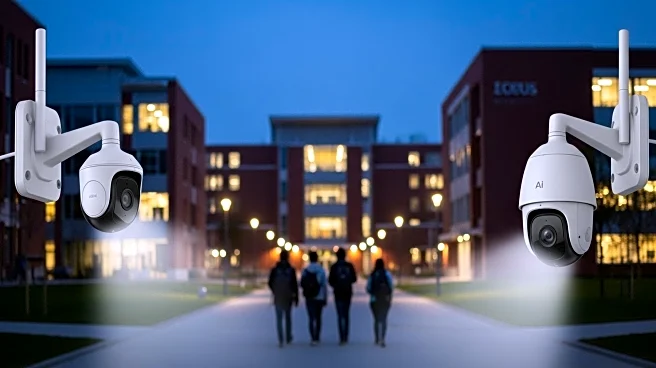What's Happening?
Higher education institutions are increasingly integrating artificial intelligence (AI) to enhance student success and campus security. AI tools are being embedded into productivity suites like Google Workspace and Microsoft 365, offering generative AI capabilities that support personalized learning experiences. These tools help students overcome challenges such as blank-page syndrome and streamline lecture note synthesis. Additionally, AI is being utilized to address mental health concerns by analyzing data to identify at-risk students, allowing for early intervention. Faculty development is also benefiting from AI, with institutions like Vanderbilt University providing resources to help educators effectively incorporate AI into their teaching practices. Furthermore, AI is being used in security operations centers to enhance cybersecurity measures, streamline student onboarding, and manage campus safety through AI-enabled cameras and access control systems.
Why It's Important?
The integration of AI in higher education is significant as it addresses multiple challenges faced by institutions, including student success, mental health support, faculty development, and campus security. By leveraging AI, universities can provide personalized learning experiences, improve mental health interventions, and enhance faculty teaching methods. The use of AI in security operations centers helps protect sensitive data and ensures campus safety, which is crucial for student trust and retention. As AI continues to evolve, its role in higher education is likely to expand, offering new opportunities for innovation and efficiency in academic environments.
What's Next?
As AI becomes more prevalent in higher education, institutions may continue to explore new applications and partnerships to further enhance their capabilities. This could include expanding AI tools for personalized learning, developing more sophisticated mental health interventions, and improving campus security measures. Universities may also focus on training faculty and staff to effectively use AI in their roles, ensuring that the technology is integrated seamlessly into academic and administrative processes. Additionally, ongoing research and development in AI could lead to new breakthroughs that further transform the educational landscape.
Beyond the Headlines
The integration of AI in higher education raises ethical considerations, particularly regarding data privacy and the potential for bias in AI algorithms. Institutions must navigate these challenges carefully to ensure that AI is used responsibly and equitably. Moreover, the reliance on AI for mental health interventions and campus security could lead to discussions about the balance between technology and human oversight. As AI continues to shape the future of education, stakeholders must consider the long-term implications of its use and strive to create an environment that prioritizes student well-being and academic integrity.









